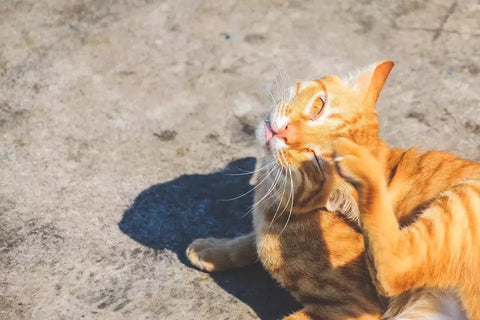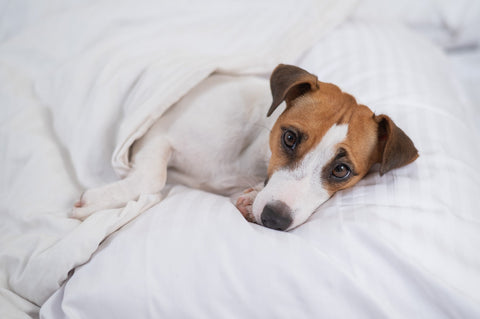Itching is pretty common to dogs. As a matter of fact, itching is one of the most common reasons why pet parents take their dogs to the vet. Itching in dogs is oftentimes exhibited on the skin, but it can also appear on other parts of the body.
In this article, we’ll talk about why rectal itching in dogs happens, its signs, what it means, and what you can do to manage & prevent an itchy dog butt.

"If your dog has rectal itching, you will notice that they will keep on licking, scratching, and will try to express their discomfort in their rectal area."
Rectal itching in dogs is simply an itch in the anal area but may also mean your dog is experiencing some anal complications and may worsen if not treated immediately. Rectal itching gets alarming if you notice that it keeps on reoccurring and is happening for a long period of time already. It's best that you begin to identify the possible causes of this because it can't be left untreated. Not only is a dog itchy butt annoying for your furbaby, but it can be the result of a more serious problem.
How do I know my dog has rectal itching
If your dog has rectal itching, you will notice that they will keep on licking, scratching, and will try to express their discomfort in their rectal area. Rectal itching can be identified when your furbaby is:
- Rubbing his rectal area on the floor
- Constantly licking his tail or his rectal area
- Constantly biting or scratching his tail or rectal area
- Your dog may appear stressed out trying to reach his rectal area for him to bite, lick, scratch, or rub
- Additional symptoms can be any pain, smell, or irritation in the rectal area
Causes of rectal itching in dogs
There can be a number of possible reasons on why your dog is experiencing rectal itching. It can be caused by:
- Food allergy or food sensitivity reactions that is expressed in the rectal area
- Flea allergy
- Yeast infection in the rectal area
- Developing tumor on or near the rectal area
- Cracks and ulcers on the skin surrounding the rectum
- Possible anal sac issues or anal-related problems like infection, anal gland impaction, etc.
- Irritation of the skin caused by feces
- Tapeworms
According to Wag Walking, pet parents know their furbabies well and will easily notice rectal itching when their furbabies lick, bite, or scoot their behind on your carpet, bed, grass, floors, and even on pavements. Note that while these are signs of an itchy rectum in dogs, these may also mean discomfort or pain in the rectal area of your dog, all which may be caused by different reasons.
If your furbaby's rectal itching does not happen somewhat frequently, it’s not something to worry about. But if your dog constantly scratches or scoots the area to the point of redness and irritation, you will want to consult with your veterinarian as soon as possible on how to stop a dog’s itchy bum from irritating them.
How can I manage my dog's rectal itching?
The management and treatment of your dog's rectal itching greatly depends on the reason why he is experiencing it in the first place. In treating rectal itching in dogs:
If it is because of any anal gland issues, it can be expressed if the glands are full and if there are any infections that occur, prescription medicines from your vet are given to your dog.
If it is because of worms, your dog may be wormed or given any medications that are able to get rid of them in your dog's body.
Worm issues can be a bit complex to diagnose unless the infestation is very bad and there are adult worms or tapeworm segments visible in the feces or stuck in the fur around your furbaby's bottom, according to Vet Call, so poop sample may be sent to the lab for further parasite analysis.
If it is because of a yeast infection, you can treat the affected area with a prescribed dog soap and a medications to be given orally or topically.
If it is is because of fissures on the areas around the anus, it can be managed through antibiotic therapies, stool softeners or constant rectal area washing.
If it is because of food allergies, changes and adjustments can be made to your dog's diet. You may also provide your dog allergy supplements that will help relieve the allergy symptoms your dog is having a hard time going through, particularly the itchiness.
Allergy supplements, like Pet Parents® Allergy SoftSupps®, help provide your furbaby itch relief and help strengthen their immune system. These can be incorporated into your dog’s everyday diet to help prevent future problems with an itchy dog butt. These supplements are made from whole ingredients, no fillers, and super-ingredients. They provide:
- Bio-Mos® that helps fight seasonal allergies and promotes a healthy immune system in all dogs.
- Wild Alaskan Salmon Oil which is rich in Omega-3 fatty acids that help support healthy skin.
- Quercetin, a plant-based source that helps maintain normal histamine levels and support normal detoxification processes.
If it is because of fleas, flea control in your dog's entire body will be the best prevention. You can consult your vet for any monthly anti-tick and anti-flea medication. You should also be able to keep your dog away from getting into dirty places and socializing with stray animals. Keep your dog's surroundings healthy for him to minimize ticks and fleas.
Keep in mind that it is not good for your dog if you DIY-medicate, even if you know what's causing their rectal itching. It is ALWAYS best to consult your veterinarian first for proper diagnosis and treatment and, if needed, rectal itching medication. Also using dog diapers is an efficient way to keep your dog away from licking, itching or scratching the affected rectal area while they are on treatment or on post-surgery if the cause of the rectal itching required certain surgeries.
Ways to prevent dog rectal itching?
Here are some dog itchy bum remedies to help prevent rectal itching in your furbaby. These preventative measures can help your dog from developing an itchy butt again in the future. Try these tips:
- Keep your dog active. Active and dog physically-fit dogs with good muscle tone are more likely to naturally release their anal gland secretions while going about their normal daily activities.
- Keep deworming and flea treatment up to date. Use only effective and safe veterinary products on all of your pet at home.
- Provide probiotics. Probiotics can help give your furbaby healthy poop! Not sure how much probiotics to give to your dog? Provide them with Pet Parents® Probiotic SoftSupps® instead. These are supplements that provide natural digestive enzyme support and strengthen your furbaby's intestinal & immune health.

"Provide them with Pet Parents® Probiotic SoftSupps®, supplements that provide natural digestive enzyme support and strengthen your furbaby's intestinal & immune health."
A dog’s itchy butt can be caused by a variety of reasons. Rectal itching in dogs can be very uncomfortable for your dog but your major role as a pet parent, aside from relieving their itchiness, is to make sure you do all means to prevent it from occurring. Good grooming practices, healthy diet, and regular vet checkups will prevent rectal itching and prevent any further complications - all for that happier and healthier life!









